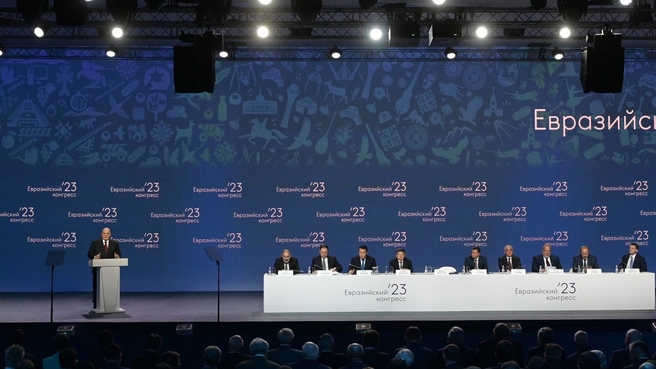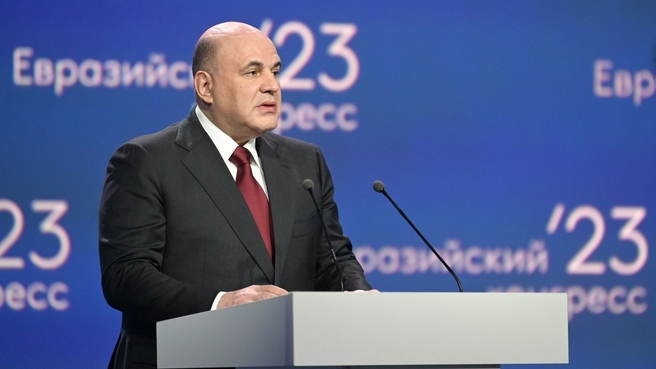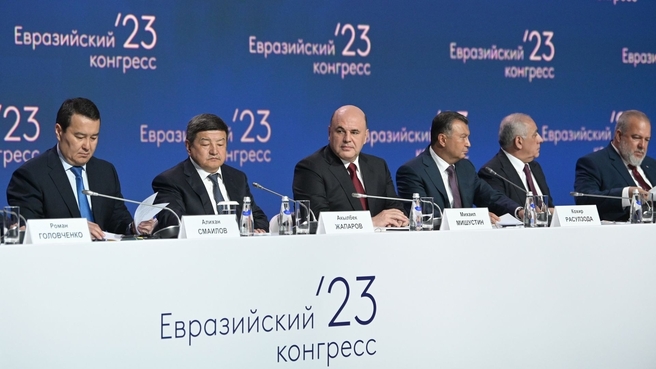The Prime Minister gave a speech at the plenary session, Eurasia of the Future: From Challenges to Solutions
The Prime Minister gave a speech at the plenary session, Eurasia of the Future: From Challenges to Solutions
Mikhail Mishustin’s remarks:
Friends, colleagues,
Let me welcome all the guests of the third congress. And, of course, I would like to thank the Eurasian Development Bank for organising this event. It has established itself as a popular platform for discussing significant issues of integration with the participation of expert and business circles, and the scientific community.
A significant part of yesterday’s discussions took place at youth sessions, in parallel with the Second Youth Forum. This indicates the significant interest of today’s generation in solving the problems we are facing. I have no doubt that a fresh look at the challenges, an alternative point of view and the flexible minds of our young people will allow us to achieve new results.
Today, ensuring food security is a very important topic in Eurasia and around the world, which is being discussed more and more. President of Russia Vladimir Putin noted that the states of the Eurasian Economic Union are making a serious contribution to solving the existing problems in this area.
The growth of our populations and the quality of life depend on this. Achieving a high level of food security is impossible without addressing dozens of other related issues. They concern the most efficient distribution of resources, the attraction of investment and the acceleration of industrial cooperation, as well as the development of transport, logistics, and scientific and technological progress.
On a global scale, the United Nations specialised agencies have been talking about the deteriorating situation in food markets for several years now.
Over the past year, it has escalated due to spikes in prices, including that of fuel and fertilisers.
Of course, in the West, as is now customary, they are trying to blame Russia for all the problems, to hold us responsible for the “coming global famine.”
At the same time, the UN does not report an acute shortage of products on a global scale. Difficulties are associated primarily with their distribution and pricing. The FAO Food Price Index is declining. Its value in April was 127.2 points, which is almost 20 percent lower than last year. Such statistics show that it is by that much – by 20 percent – that the world prices for a basket of food commodities have increased.
International experts believe that the root causes of such food inflation lie, first of all, in global economic imbalances, systemic errors and miscalculations in the macroeconomic and energy policies of the largest Western countries.
Unilateral measures of external pressure have only exacerbated negative trends, provoked high volatility in the world market and ultimately led to a global imbalance.
The increase in energy prices, caused by the West’s desire to accelerate its energy transition to renewable sources, has led to higher transportation tariffs. And the cost of fertilisers has tripled since 2020, as up to 80 percent of their production costs come from natural gas.
The availability of such a valuable commodity for agricultural producers has now decreased to the level of the 2008 food crisis.
In today’s situation, the Eurasian countries play a special role. We have unique agroindustrial potential, which is showing positive dynamics even in today’s difficult conditions. Almost a tenth of the world’s arable land, as well as permanent pastures and grasslands, is concentrated here, in Eurasia. There are opportunities to further expand them and increase land use efficiency.
Thanks to our integration, we can maintain the balance, stabilise prices in the off-season through mutual deliveries of goods, and fight food inflation.
The Eurasian Economic Union has reached the level of self-sufficiency in most food products, which we spoke about in detail yesterday: 80–95 percent. Our production covers the demand of people for the main types of goods – grain, vegetable oils, pork, lamb, sugar and eggs. We import from third countries only what we cannot grow ourselves, primarily because of natural conditions. So we can already talk about independence in this area.
The [Eurasian] Five countries not only cover their needs in a number of goods. We export quality products abroad as well. And here we have a leading position in some areas.
For example, the union has been first in wheat exports for several years in a row, and is among the top 10 exporters of barley, corn, oilseeds and frozen fish.
The potential is even higher. In the future, we will be able to feed at least twice our own population, if we coordinate our actions. Importantly, we will improve the competitiveness of our products, overcome our dependence on imported high-tech equipment, and adapt the agro-industrial complex to the changing climatic conditions.
Water supply remains a key factor; we need large-scale projects in this area. It is important to reduce the losses of our agricultural producers by developing current transport routes and upgrading logistics infrastructure.
We have solid experience in strengthening food security. A general outline and approaches were approved two years ago. They underscore the unacceptability of discrimination in our agricultural market.
Now, we need to focus on the creation of a system to monitor food availability in the [Eurasian] Five. We also need an emergency fund to mitigate potential crisis developments. We discussed this at the Intergovernmental Council meeting.
There are a number of other goals. Significant amounts of seed, planting material, pedigree products, veterinary drugs and agricultural equipment are imported to union markets from third countries. I would like to urge more active involvement in efforts to supply farmers with the necessary resources and equipment with domestic production. It is very important to develop joint research in these fields and encourage the transition to allied solutions.
Russia is ready to share its experience and best practices. Russian agriculture has shown excellent results for several years now. We are proud of them. The level of food security in our country is one of the most reliable in the world. Last year, we achieved the figures reflected in the national doctrine approved by President Vladimir Putin. We are fully self-sufficient in grain, exceeding our targets by two times in some cases. More than twice as much for vegetable oil, and about one and a half times as much for fish. We achieved the target values for sugar and meat. We are very close to the target values for potatoes and vegetables.
Russia continues to fulfil international contracts on the export of agricultural products, fertilisers and energy resources around the world in a responsible and conscientious manner. Including the provision of humanitarian aid to people in the countries most in need. Against a backdrop of market turbulence, we are well aware of our role in supplying socially important goods to developing countries.
In the framework of the International Food Aid Convention, we have increased our commitments. And through the UN World Food Programme alone, we have provided support worth some $200 million in different regions of the world over the past three and a half years.
Dear colleagues,
The Eurasian Economic Union is making a major contribution to the establishment of a sustainable international trading system. The growing interest in the integration processes in the region on the part of Asia, the Middle East, Africa, Latin America and the Caribbean testifies to this. I propose that we also work together on food security. I sincerely hope that by working together we can finally make the world forget about food shortages.
Thank you for your attention. And of course, I wish the congress participants successful work and interesting and constructive discussions.










